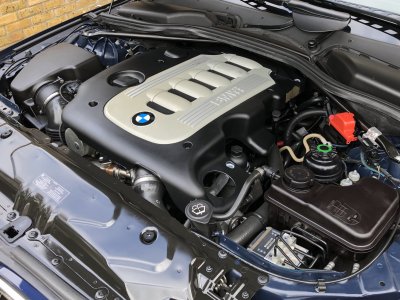
I'd looked for an E500 estate for six months and couldn't find one. Lobbying from diesel BMW enthusiasts resulted in me buying a 535d SE touring.
Which is a lovely car but.... I've decided to get rid of it after 8,000 miles (including a 3,000 mile trip round France this Winter).
The 535d SE is a lovely car: Powerful, especially in the mid range, good looking (LCI version: less "Edna"), a good size, and a smooth ride on normal tyres and SE suspension (avoid M Sport & run flats)
But, I really don't like the turbo diesel thing. I much prefer the smooth, endless acceleration of petrol.
As for the "Tractor" allegation: I don't see that as an issue. Might be true for small diesels, but the noise of the 3.0 litre diesel is not at all intrusive.
The "Economy" argument is a fallacy. Diesel is more expensive, and there's no question that diesel engines cost more to maintain, beyond the first five years. (I personally haven't had any problems at all - but others can provide plenty of evidence)
Fuel economy is usually a bit of a red herring. When someone tells me they're spending £5k a year to finance a new big family hatchback, I get the vapours. Ownership cost is about depreciation, finance, tax and fuel.
So I'm back in a superb, immaculate, as new E350 petrol "for family duties." But if anyone has an E500 Estate.....

